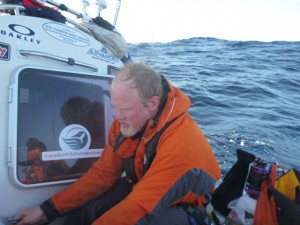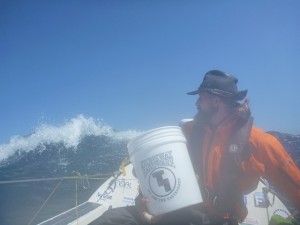
[We get a LOT of questions about the day-to-day life aboard the ‘James Robert Hanssen’ – or JRH for short – while at sea. The #1 question has to do with what we’re doing with buckets (very fair, VERY important). The #2 question is “How the heck do you stay clean out there?!?” Adam weighs in:]
Clean. Exactly what does “clean” mean on the James Robert Hanssen? Well, our clean is not quite what you land lubbers might usually think of “clean.” Rather, I would describe our cleanliness as, well, an “Ocean Clean.” We do not have the grime, germs and bugs of the land, but we have the challenge of seawater with its bacteria-laden, salty wetness.
Don’t get me wrong. Out here – mostly for our moms’ sake – we would love to be “Land Clean.” But the JRH is a boat of compromises and our hygiene schedule is no different.
In civilization, we often think of the instant gratification we gain from cleaning: warm water feels nice, we don’t smell, we look good. People want to hang out with us when we are clean, and our moms say we look handsome. However, we sometimes forget the serious longer-term health issues that we prevent through a regular hygiene schedule.
Without regular washing (and drying) your body starts to develop sores. Ingrown hairs, pimples and open sores show up more regularly. …AHEM… How do I put this? Your undercarriage is the most important part. It’s a bit gross, but please think about it: You are spending 12+ hours a day sitting on a rowing seat. You are on a boat where standing is difficult, so you sit during your off-shift. You sleep with your bottom laying against the cabin cushions. (Yes Mom, we clean these surfaces regularly).
Ouch!

Every day we have alarms that go off to remind us to brush our teeth, put on sunscreen and wash. Washing is the most important. We wash in the kitchen/science/living room area in front of the two rowing stations. Its a bit of a show for the those who are rowing… Our first rinse is with salt water and minty fresh Dr. Bronner’s Magic Soap. After the saltwater bath, we take 1/2 to 1 liter of fresh water to rinse off our body. Now that’s fresh water conservation! (Try that at home…) Thankfully, after bathing we then clean the kitchen area. We usually clean up with our pants off. Awkward, but being dry dry dry is important!
In our first week rowing, after an outbreak of derriere sores, we instituted a policy: Operation Dry Bum. The first couple days we were wearing surf shorts that stayed wet. This was bad. Very bad. We now religiously use our Kokatat goretex pants in messy water. They block seawater splashes from ruining our seat time while wicking sweat away. Thanks Kokatat!
When sores get painful, itchy swollen and sticky, the first step is regular cleaning and drying. We clean as above or use baby wipes to supplement cleaning throughout the day. After some air drying we apply Bag Balm (a Vermont remedy for chapped cow udders) or diaper rash cream. Moms, please be assured, after our first week mishap, we are now caring prudently and regularly for that beautiful bottom you protected while we were young and diapered.
Future adventurers beware! Dry, clean bodies are key to an enjoyable time in the great outdoors. With enough forethought, the right equipment (like Kokatat), and proper discipline, you too can avoid the pitfalls of itchy, swollen body sores.
